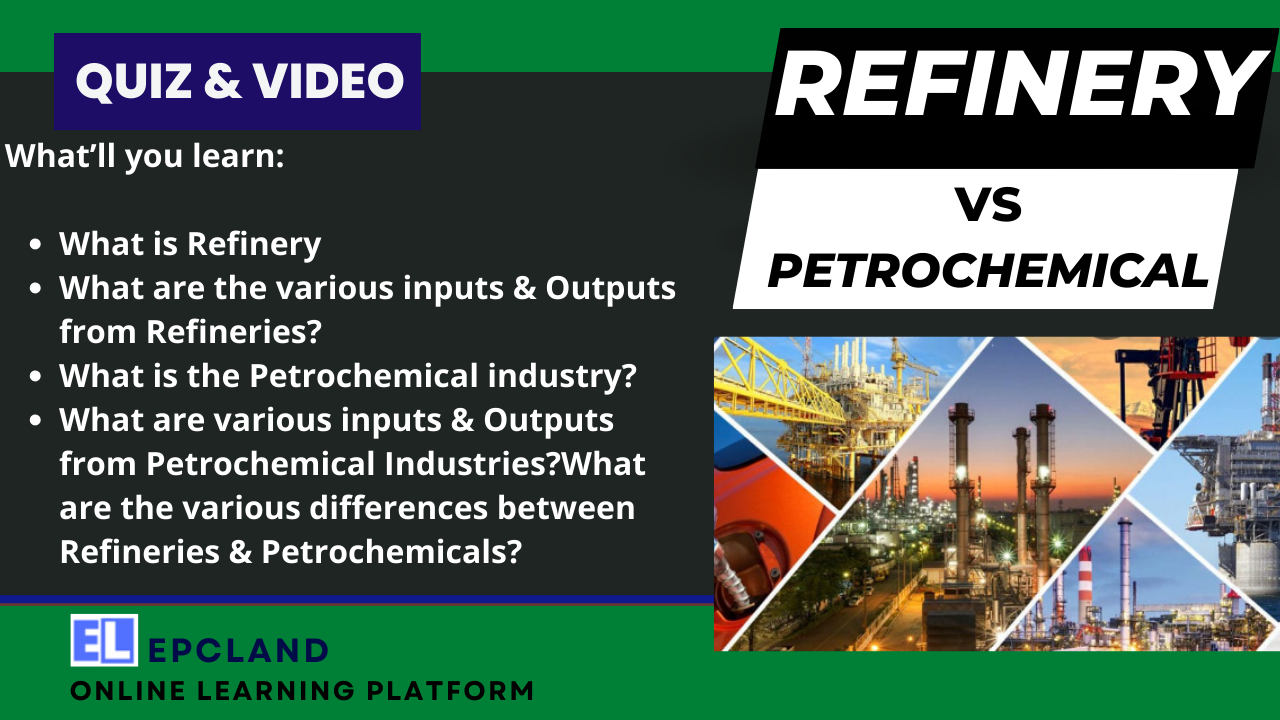Introduction
Refineries and the petrochemical industry are integral components of the global energy and manufacturing sectors. They play a pivotal role in processing raw materials and converting them into valuable products that power our lives and drive economic growth. In this comprehensive guide, we’ll delve into the world of refineries and petrochemicals, exploring their definitions, functions, inputs, outputs, and the key differences between them.
Table of Contents
Don’t miss the Complete Course on Piping Engineering: Check Now
By EPCLand.com
What is a Refinery?
A refinery, also known as an oil refinery or petroleum refinery, is a complex industrial facility designed to process crude oil into a range of refined products. These products include gasoline, diesel, jet fuel, heating oil, and various petrochemical feedstocks. Crude oil, as it comes out of the ground, contains a mixture of hydrocarbons with different boiling points. Refineries employ various processes to separate and convert these hydrocarbons into useful products.
Inputs to Refineries
- Crude Oil: The primary input for refineries is crude oil, which serves as the raw material for the production of refined products.
- Natural Gas: Refineries often use natural gas as a fuel and feedstock for various processes.
- Water: Water is essential for cooling and various chemical processes within the refinery.
Outputs from Refineries
- Gasoline: A primary transportation fuel.
- Diesel: Used for trucks, buses, and certain vehicles.
- Jet Fuel: Used in aviation.
- Heating Oil: Used for space heating and industrial applications.
- Lubricating Oils: Used in engines and machinery.
- Petrochemical Feedstocks: Used as raw materials in the petrochemical industry.
What is the Petrochemical Industry?
The petrochemical industry involves the production of a wide range of chemicals and products derived from petroleum and natural gas. These chemicals serve as feedstocks for various industries, including plastics, textiles, pharmaceuticals, and more. Petrochemical processes involve transforming hydrocarbons into valuable chemical compounds through various chemical reactions.
Inputs to Petrochemical Industries
- Ethylene: A primary building block for many petrochemical products.
- Propylene: Used in the production of plastics and other chemicals.
- Butadiene: Used in the production of synthetic rubber and plastics.
- Benzene, Toluene, Xylene (BTX): Used as feedstocks for various chemicals.
- Methanol and Ammonia: Used in the production of chemicals and fertilizers.
Outputs from Petrochemical Industries
- Plastics: Including polyethylene, polypropylene, PVC, and more.
- Synthetic Fibers: Such as polyester and nylon.
- Rubber: Both synthetic and natural rubber products.
- Chemicals: Including solvents, detergents, fertilizers, and more.
Differences Between Refineries and Petrochemicals
- Primary Focus:
- Refineries focus on converting crude oil into refined products like fuels and petrochemical feedstocks.
- Petrochemical industries focus on producing chemicals and products derived from hydrocarbons.
- Outputs:
- Refineries primarily produce fuels and a limited range of petrochemical feedstocks.
- Petrochemical industries produce a wide array of chemicals, plastics, and synthetic materials.
- Processes:
- Refineries involve processes such as distillation, cracking, and reforming to separate and convert hydrocarbons.
- Petrochemical industries employ complex chemical reactions and processes to create specialized chemicals.
- Feedstocks:
- Refineries use crude oil and natural gas as their primary feedstocks.
- Petrochemical industries use specific hydrocarbons like ethylene, propylene, and benzene as feedstocks.
- Products’ End Use:
- Refinery products are mainly used as fuels for transportation, heating, and energy generation.
- Petrochemical products are used as raw materials in various manufacturing industries.
FAQs
Q1: What is the main function of a refinery? A1: Refineries process crude oil to produce refined products like gasoline, diesel, and petrochemical feedstocks.
Q2: How are petrochemicals used in everyday life? A2: Petrochemicals are used to produce plastics, synthetic fibers, pharmaceuticals, and various industrial chemicals.
Q3: What’s the difference between a petrochemical plant and a refinery? A3: Refineries focus on fuel production, while petrochemical plants produce chemicals used in various industries.
Q4: How does the petrochemical industry contribute to the economy? A4: The petrochemical industry provides raw materials for numerous industries, driving economic growth and innovation.
Q5: Are there environmental concerns related to refineries and petrochemicals? A5: Both industries face environmental challenges related to emissions, waste management, and resource consumption.
Conclusion
Refineries and the petrochemical industry are vital components of our modern world, playing critical roles in energy production and manufacturing. While refineries convert crude oil into essential fuels, petrochemical industries create an array of chemicals and materials that underpin various sectors. Understanding the differences between these industries helps us appreciate their significant contributions to our daily lives and the global economy.
Recommended courses (Published on EPCLand)
- Basics of Piping Engineering
- Piping Layout Engineering
- Piping Material Engineering
- Piping Stress Analysis
- Complete Course on Piping Engineering
- Material Requisitions
- Piping Material Specifications
- Valve Material Specifications
Don’t miss the published articles on following:
Related Video
Attempt Quiz
Question 1:
What is a refinery?
Explanation: A refinery is a facility that processes crude oil through various chemical processes to produce fuels (such as gasoline, diesel, and jet fuel) and other products.
Question 2:
What are the various inputs and outputs from refineries?
Explanation: Refineries take crude oil as input and produce various outputs, including fuels like gasoline and diesel, as well as petrochemical feedstocks used in the production of chemicals and plastics.
Question 3:
What is the petrochemical industry?
Explanation: The petrochemical industry is focused on producing chemicals and plastics from hydrocarbons derived from crude oil and natural gas.
Question 4:
What are the various inputs and outputs from petrochemical industries?
Explanation: Petrochemical industries use petrochemical feedstocks to produce a wide range of outputs, including plastics, chemicals, synthetic materials, and more.
Question 5:
What are the various differences between refineries and petrochemical industries?
Explanation: Refineries primarily focus on processing crude oil into fuels, while petrochemical industries focus on converting hydrocarbons into a variety of chemicals and plastics.



